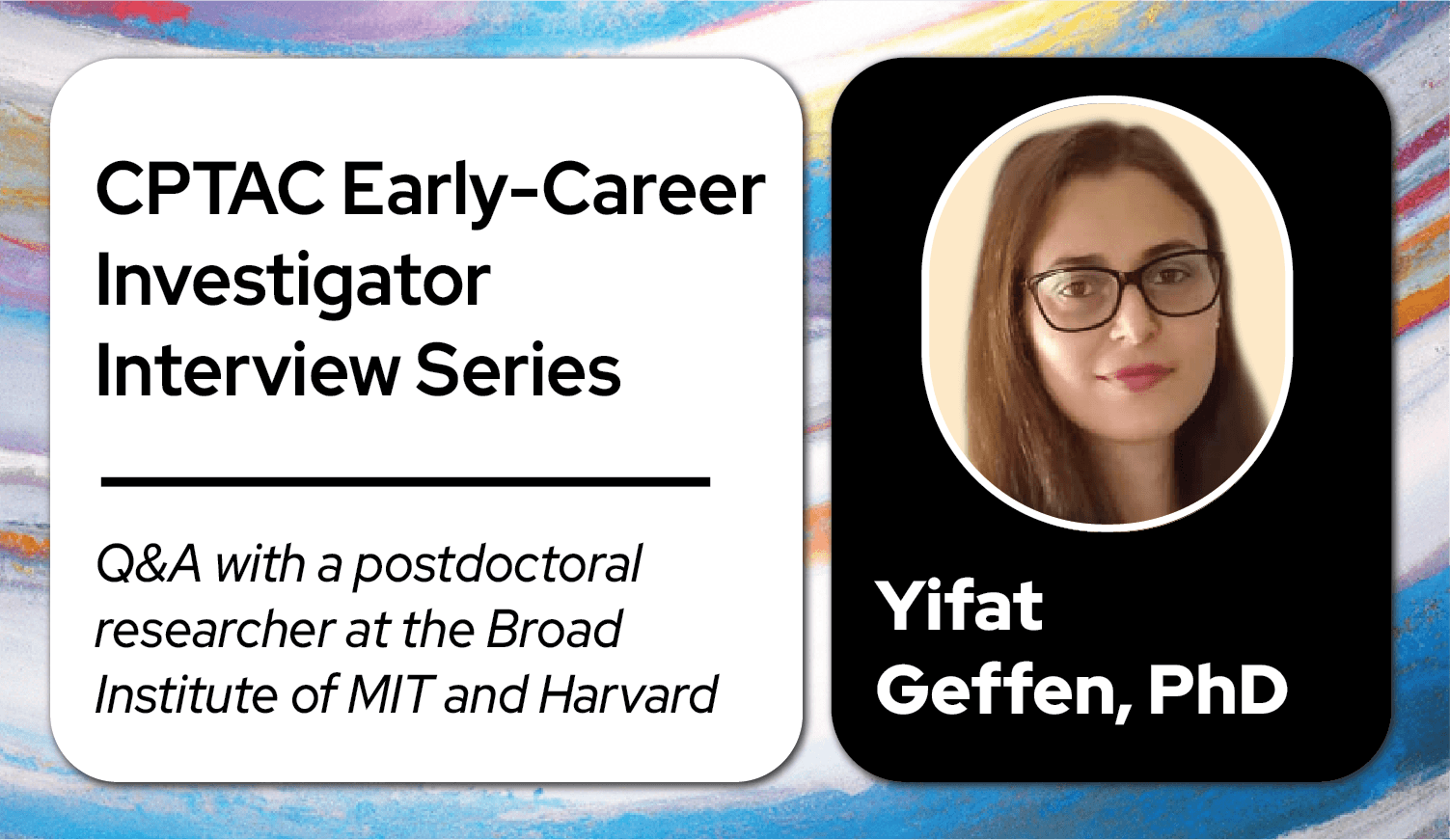The following is the fourth entry in a Q&A series highlighting selected Clinical Proteomic Tumor Analysis Consortium (CPTAC) researchers and their work. Join us as we discuss multiple facets of proteogenomics research with Yifat Geffen, PhD, a postdoctoral researcher at the Broad Institute of MIT and Harvard. Transcript is edited for clarity.

Q: Please describe your academic/professional journey to date.
YG: Throughout my career I have explored various areas of science. I began with a focus on biology during my undergraduate studies. Later I earned my MS in Human Genetics which exposed me to the vast realm of human disease. And then, since I really wanted to dive deeper into molecular mechanisms underlying health and disease, I embarked on my graduate studies in biochemistry at the Hebrew University of Jerusalem. My research focused on developing a method for systematically identifying structural elements that are responsible for protein instability driven by the ubiquitination system mainly, which really piqued my interest in post translational modifications.
Q: Please describe your current work at the Broad Institute. What do you find most compelling about this work?
YG: Driven by my curiosity about the potential of bioinformatic analysis to further our understanding of how post-translational modifications rewire cancer cells, I applied for a postdoctoral position in the Getz lab. Now, working in this environment, I am able to explore the shared and dysregulated mechanisms within the CPTAC’s large post translational modification data. This particular research fascinates me because it really opens up avenues for connecting both genotypes and phenotypes and enabling better understanding of characterization of disease states.
Q: Can you elaborate on how your hybrid experience with wetlab and computational work benefits your research?
YG: Sure. My decision to join a mostly computational lab was driven by the desire to complement my experimental work and enable me to address broader scientific questions, which you can’t do when you're doing solely wetlab experiments. Possessing both [skillsets] has proven to be really invaluable in my research because it allows me to enhance the design of my experiments as well as validate the findings. Furthermore, this dual expertise enabled me to effectively collaborate with teams that have similarly diverse skillsets and foster a shared vision towards common objectives like we are always doing in cancer, it is not a ‘one man's mission.’
Q: What are some of the challenges you see in the field of proteogenomics right now, and how do you think we can overcome them?
YG: As we discussed, because this field and proteogenomics in general is really in its early stages, there are numerous ways we can aim for progress. For example, we have seen significant advancements in mass spectrometry, but it still lags behind the capabilities of next-generation sequencers. However, I'm really optimistic that in the coming years we will witness substantial improvements enabling us to explore much more of the post-translational modifications I'm specifically interested in. Additionally, as we move towards single-cell analysis the proteogenomic domain holds great potential for gaining deeper insights into spatial and temporal heterogeneity of cancers. Our current focus is on developing more robust frameworks as well as tailored analysis to study those areas effectively and refining these approaches. We aim to significantly advance our understanding of proteogenomics and unravel the intricate mechanisms by which post-translational modifications operate.
On the social front I think we are really making strides in the right direction. I would love to see an even higher participation of women scientists in the STEM careers. In basic biology and also in computational we are really lacking a lot of women scientists. And I think that to [improve] this, we really need to pursue and to engage young women early on in their education to foster their interest.
Q: How would you advise a student who's interested in pursuing a career in proteogenomics or computational biology?
YG: So for young scientists, I would advise them to embrace diversity in their skillset, not to stay just in one field. I think that opening up new paths [is important], even if they're uncharted territory. I would tell them to stay curious and adaptable. Be ready to take on challenges, because this is really the best way that we can advance our field. Be persistent and stable in your decisions because, especially in science, we need a lot of hours and oftentimes it comes with frustration. I think that when we overcome those [frustrations], we come up with really magnificent ideas and new discoveries, which is really the heart of science. I would say to endure through the challenges because, at the end of the day, the scientific breakthroughs that come on the other side of the challenges are what we ultimately strive for.

